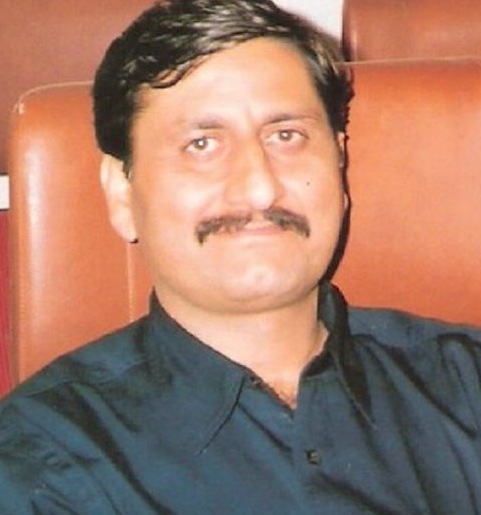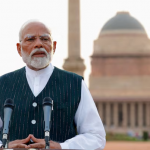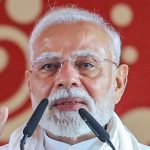FRAGRANCE OF IDEAS
Over the last some months in particular, the External Affairs Ministry of the government of India is exhibiting a lot of activism in terms of a number of statements, actions and reactions in regard to the geo-political scenario that has interestingly attracted attention around the globe. The primary lead in this regard has been taken by the External Affairs Minister, Dr. S. Jaishanker himself. The other two key political and strategic figures that have made an unprecedented impact in this context include the Prime Minister of India, Narendra Modi and the National Security Adviser, Ajit Doval. India’s permanent representatives at the UN including Ruchira Kamboj, Arindam Bagchi and the spokesperson/s of the EAM are also in the business of sorts and thus in the news as well.
The newly developed or an evolving situation in this regard seems to be a departure from the earlier position of the government of India in relation to the sensitive management of its external affairs. Gone are the days when India would treat such issues with the mindset of ‘touch-me-not’ and would take an apologetic-docile or passive approach than an active or frontal position in regard to the matters incidental to or connected with the external affairs. The completion of the ten years of the Modi regime and the re-election of the BJP-NDA government headed by Modi for the third term have indeed strengthened the resolve of the current dispensation to continue to play a proactive role on geo-politics. India is being seen as a leader of the global south and also as a major factor to bring the required balance in international political and strategic affairs.
Once India decided to depute its External Affairs Minister, S. Jaishankar to Islamabad for the Shanghai Cooperation Organisation (SCO) Summit scheduled to be held there on October 15-16, it was quick to clarify that the visit to Pakistan by him wasn’t aimed at to initiate the Indo-Pak relations. It said that India was going to Pakistan to attend a ‘multilateral meeting’ in connection with the SCO and not to discuss ‘any bilateral ties’. This is significant in the context that some statements were being circulated by a number of political groups and leaders in Pakistan welcoming his visit and also ‘inviting’ S. Jaishankar to their programmes being held therein. Some others also tried to interpret the development to fit their own narrative on Indo-Pak affairs.
The Minister himself made an elaborate statement in this context while speaking at the annual Sardar Patel Memorial Lecture in New Delhi. “I’m not going there to discuss India-Pakistan relations……I’m going there to be a good member of the SCO. But since I am a civil and courteous person, I will behave accordingly”, he said, thus also hinting that he won’t train his guns at the hosts in Pakistan. Since December 2015 (now almost a decade), India and Pakistan have not conducted any bilateral meeting or talks at a ministerial level. It was last time during the EAM Sushma Swaraj’s visit to Islamabad that such a meeting had taken place.
He also made it amply clear that holding SAARC Summit (which has not been held since 2014) ‘would be tantamount to normalizing Pakistan’s support to cross-border terrorism’. He went further ahead and added that ‘we have decided not to legitimize terrorism as a legitimate tool of statecraft since one member of the SAARC is encouraging and involved in cross-border terrorism against another member of the SAARC’. Jaishankar will be attending the SCO Summit in Islamabad along with the leaders from Russia, China, Kyrgyzstan, Kazakhstan, Uzbekistan, Tajikistan, Belarus and Iran besides Pakistan.
The visits of PM Modi to Russia and Ukraine are being seen as a pointer towards putting a possible end to the ongoing war between the two nations for the last three years. PM Modi also made it very clear that India was for the establishment of peace in the region and the ‘war was no solution to the problems’. It had surely made an impact on the situation and the ‘conversations’ between the leaders were followed up by certain important steps by India’s EAM as well.
India, during the war between Russia and Ukraine, decided to purchase oil from Russia that suffered sanctions imposed by the West. India used and sold the same oil to the West after refining it in India and thus averted the global oil crisis and inflation due to the war and the sanctions. In the meantime, India has very diligently continued the oil purchases from Russia; and in July 2024, it purchased crude oil from Russia worth Rs. 23,504 crores. India is well aware of the fact that it was the third largest oil importing and consuming nation in the world and thus had an appropriate leverage to settle the prices in the larger context in case it acted proactively; and it did so aptly without any sort of fear or indecisiveness.
India as a nation recognizes the 7th October 2024 aggression of Hamas on Israel as a blatant terrorist attack and has thus openly sympathized with Israel on the issue. But at the same time, it reiterated its commitment to a two-nation theory in the Middle-East, one nation for Israel and the other for Palestine. India has plainly refused to accept the illogic of ‘good terrorism’ and ‘bad terrorism’ in any context. In the ongoing war between Iran-Hamas-Hezbollah etc and Israel, the top leaders of Iran bank upon the Indian leadership to bring Israel to the negotiating table since it was a great friend of India. They made statements in this connection publicly. The EAM of India is keeping its options open and is playing its cards very discreetly and wisely.
Ever since the organization of the G20 Summit in New Delhi last year, the EAM has enhanced its role and position in the global affairs and has engaged in the UN affairs actively, South-South dialogue proactively and the dealings with the west with determination and firm footing. The diplomatic row with Canada, US, Maldives, Turkey and Malaysia were dealt with ease, success and the required finesse. However, it has maintained that the West needs not to advise the other nations on all issues and stop interfering in their internal affairs.
The recent rejection of the US State Department’s 2023 religious freedom report on India is a classic example in this regard. “As in the past, the report is deeply biased, lacks understanding of India’s social fabric and is visibly driven by vote bank considerations and a prescriptive outlook. We, therefore, reject it,” the government of India said last Friday in a sharp reaction to the report. It further said that the report (in question) challenged the integrity of some decisions made by the country’s judiciary and the incidents were handpicked to form a preconceived narrative. This very vividly puts in perspective the approach the EAM of India has developed over the issues that concern India and its interests and assets globally.
In regard to the Bangladesh crisis, India categorically said that it was the “internal matter” of Bangladesh. However, it brought to the notice of the new regime therein that India was concerned about the fate and future of the minorities in Bangladesh. India’s External Affairs Ministry made it clear that India was always interested in having ‘stable relations with its neighbours’ as the neighbours were dependent on each other. India will continue the relationship that has historical background and bearing on the future of the region.
The recently held QUAD Summit in the US, that includes US, Japan, Australia and India, has acknowledged the role of India as a global leader that should have a permanent seat in the UN Security Council. Summit for the Future at the UN was also a grand success for the MEA. In the meantime, India has also given vivid hints of expansion of the BRICS while nations in the South-East, Middle-East, Africa and South America have shown tremendous interest in joining the platform. Once there is a consensus on this issue among the founding fathers of BRICS, the EAM is supposed to take the next steps in this regard.
Keeping in view the pace of the geo-political developments, the next steps of the External Affairs Ministry of the government of India are expected to include more Memorandums of Understandings and Agreements as also a greater push to the bilateral trade and commerce as well. Surely, the EAM seems all guns blazing with an eye upon its flight to the new horizons in future.
(The author is a senior BJP and KP leader, human rights defender, author and columnist and can be reached at: [email protected])








